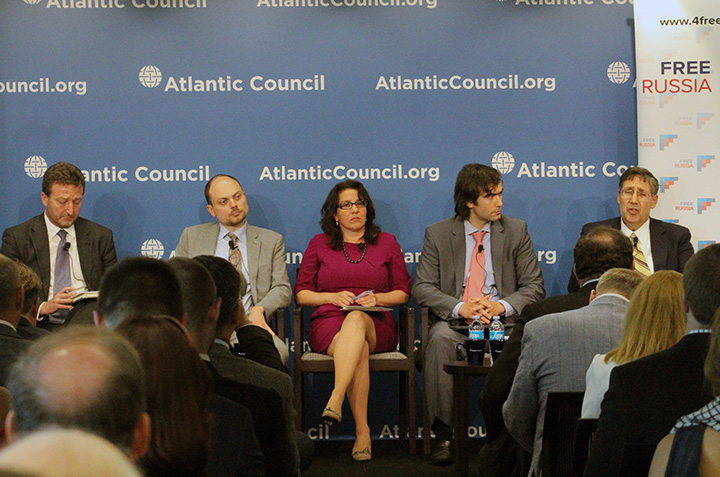
Russian opposition leader cites importance of participation in parliamentary elections
In a climate of repression and authoritarianism institutionalized by Russian President Vladimir Putin, opposition parties “must use every opportunity to challenge” the Kremlin even if it means participating in a “flawed and truncated election process,” according to a Russian opposition leader.
“As the [parliamentary] election approaches…we have decided against a boycott. We have decided to participate because…we know there are many people in Russia who reject the autocracy and isolationism that have become the hallmarks of the current regime,” said Vladimir Kara-Murza, deputy leader of Open Russia, a movement that supports a democratic vision for Russia’s future.
“We owe it to these people to give them a voice and a vote in the upcoming election,” he added.
Kara-Murza spoke at an event hosted by the Atlantic Council’s Dinu Patriciu Eurasia Center in Washington on June 9. Pavel Khodorkovsky, president of the Institute of Modern Russia; Miriam Lanskoy, senior director of Russia and Eurasia at the National Endowment for Democracy; and John Herbst, director of the Council’s Eurasia Center, also joined the discussion. New York Times correspondent Steven Myers moderated the panel.
Parliamentary elections will be held in Russia in September. Results from the previous parliamentary election in 2011 catalyzed a two-year protest movement, where thousands of people took to the streets of Moscow to demonstrate against what they said were fraudulent election procedures. Russian authorities cracked down on opposition party members and activists who sought more media and electoral freedoms. Alexei Navalny, a key opposition leader, was arrested in 2014. Another prominent opposition leader, Boris Nemtsov, was assassinated while walking near the Kremlin on February 27, 2015.
The protest movement reached its peak in May of 2012 before Putin was inaugurated for his third term, when more than four hundred people were arrested or injured in Moscow alone. Since then the so-called Snow Revolution has dissipated and the Russian government has enacted laws making large demonstrations illegal.
On April 6 of this year, Putin established a new “National Guard,” which has been mandated to “combat domestic terrorism.” Oppositionists have claimed that the new military arm is being deployed to crack down on their activities leading up to the September vote. The National Guard is headed by Putin’s former bodyguard Viktor Zolotov, who reports directly to the president.
“This new arms structure will number 400,000 people…it will have the right to use force to arrest people, to enter people’s homes, and to shoot without warning in the event of ‘mass disturbances,’ which is Kremlin-speak for street demonstrations,” said Kara-Murza.
Outside of pressures borne out of curbs on media and electoral freedoms, Putin’s administration has been beset by a falling GDP, European sanctions over its annexation of Crimea in 2014 and support for separatists in eastern Ukraine, and a decline in global oil prices.
The September elections will take place in this depressed economic climate and an unprecedented narrative of voter discontent toward Putin and United Russia—the political party which he leads. Earlier this year, the Russian Duma passed an election law that skews voter counts in electoral districts in favor of the United Russia ticket.
“What I take away from all these discussions regarding the elections is that Mr. Putin’s popularity is really not that high. Putin needs the elections because he doesn’t know any other way—ultimately—to legitimize himself to his own population or internationally. And that is why we see all of the restrictions being employed today [by Putin],” said Herbst.
“All societies have a right to have their voices heard. Those voices can be heard through legitimate elections,” he added.
Despite the realities of repression in Russia, Kara-Murza remains cautiously optimistic about Russia’s long-term future.
“The big picture is that we know that these regimes end and most of them end the same way—this one is not going to be an exception. It may get worse first, but at some point it will stop and get better,” he said.
Mitch Hulse is an editorial assistant at the Atlantic Council. You can follow him on Twitter @mitchhulse.
Image: From left: Steven Myers, a correspondent for the New York Times, moderated a panel with Vladimir Kara-Murza, deputy leader of Open Russia; Miriam Lanskoy, senior director of Russia and Eurasia at the National Endowment for Democracy; Pavel Khodorkovsky, president of the Institute of Modern Russia; and John Herbst, director of the Atlantic Council’s Dinu Patriciu Eurasia Center, in Washington on June 9. (Atlantic Council/Sarah Straney)
